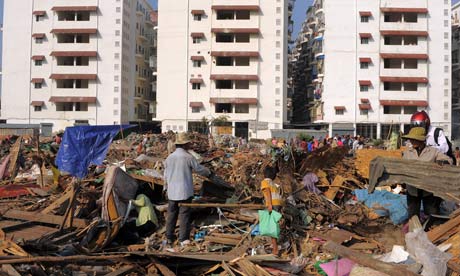សម្តេច ហ៊ុន សែន៖ ទំនាស់ដីធ្លីរវាង ប្រជាពលរដ្ឋនិង ក្រុមហ៊ុនរាជរដ្ឋាភិបាល ជាអ្នកដោះស្រាយ
ភ្នំពេញ៖ សម្តេចតេជោ ហ៊ុន សែន ថ្លែងថា បញ្ហាទំនាស់ដីធ្លីរវាង ប្រជាពលរដ្ឋជាមួយដីក្រុមហ៊ុន ព្រៃសម្បទាន ឬព្រៃត្រូវការពារ ប្រមុខរាជរដ្ឋាភិបាល មានតួនាទីដោះស្រាយ រាល់បញ្ហាដែលកើតឡើង ដោយកាត់ដីរបស់ ឯកជនទាំងឡាយណា មកឲ្យប្រជាពលរដ្ឋជាអ្នកកាន់កាប់វិញ។ សម្តេចនាយករដ្ឋមន្រ្តី ហ៊ុន សែន បានថ្លែងបែបនេះ ក្នុងឱកាសចុះចែកប័ណ្ណ កម្មសិទ្ធដីធ្លីជូនប្រជាពលរដ្ឋ នៅស្រុកគាស់ក្រឡ ខេត្តបាត់ដំបង នៅព្រឹកថ្ងៃទី៣០ ខែកញ្ញា ឆ្នាំ២០១២ថា ជម្លោះដីធ្លីរវាងប្រជាពលរដ្ឋ ជាមួយពលរដ្ឋដូចគ្នា រាជរដ្ឋាភិបាលមិនមាន សិទ្ធិទៅធ្វើប័ណ្ណកម្មសិទ្ធិ ជូនពួកគាត់ទេ ប៉ុន្តែបើមានជម្លោះ ជាមួយបណ្តាល ក្រុមហ៊ុនឯកជន ព្រៃសម្បទាន ឬព្រៃការពារ ប្រមុខរាជរដ្ឋាភិបាល មានតួនាទីជាអ្នកដោះស្រាយ ហើយនឹងដកហូតយកដី ទាំងនោះមកឲ្យប្រជាពលរដ្ឋវិញ។ បើដូច្នេះក្រុមហ៊ុន ដែលមិនទាន់ មានការដាំដុះអ្វីមួយនោះ ហើយប៉ះពាល់ត្រង់កន្លែងណា ក៏ត្រូវកាត់ឲ្យប្រជាពលរដ្ឋដែរ។
សម្តេច ហ៊ុន សែន បានបញ្ជាក់ថា ”អីចឹងប្រជាជនអត់មាន ទៅទាស់ជាមួយក្រុមហ៊ុនទេ រដ្ឋទទួលបន្ទុក ធ្វើការងារហ្នឹង ឥឡូវគឺប្រជាពលរដ្ឋ គាត់ធ្វើនៅកន្លែងហ្នឹង អ្នកណាមានសិទ្ធិកាត់ គឺរដ្ឋមានសិទ្ធិកាត់ ហើយមិនចាំបាច់ទៅចរចា ជាមួយក្រុមហ៊ុនឯកជនទេ យើងតម្រូវទៅយក ឲ្យពួកគាត់ជាប្រជាពលរដ្ឋ លើកឡែងតែ ការដាំដុះរួចហើយ អាហ្នឹងយើងទៅយកវាអត់ត្រូវ”។ ប្រមុខរាជរដ្ឋាភិបាល សម្តេច ហ៊ុន សែន បន្តថា ប៉ុន្តែបើមិនទាន់មាន ការដាំដុះគ្រាន់តែចេញ អនុក្រឹត្យ ឬអនុបយោគ ឬក៏នៅទម្រង់បែបបទអីនោះ តែប្រជាពលរដ្ឋបានធ្វើការដាំដុះត្រង់ចំណុចហ្នឹង ហើយត្រូវកំណត់ឲ្យពួកគាត់ ដោយមិនទាន់ មានភាពច្បាស់លាស់នោះ ដោយសារបញ្ហា ទាំងនេះហើយ បានជាតម្រូវឲ្យមានការវាស់ វែងដីផ្តល់កម្មសិទ្ធិឲ្យប្រជាជនជាមុន។
សម្តេច នាយករដ្ឋមន្រ្តី បន្ថែមថា បើក្រុមហ៊ុនចាប់ផ្តើមឈូសឆាយ ហើយមានការប៉ះពាល់ ដល់ដីប្រជាពលរដ្ឋក្រុមហ៊ុន ត្រូវផ្អាកជាបន្ទាន់ ដើម្បីទុកលទ្ធភាពឲ្យ អាជ្ញាធរដោះស្រាយ ដោយកាត់ចេញពីផ្ទៃដី របស់ក្រុមហ៊ុន កាត់ឲ្យប្រជាពលរដ្ឋ តាមរយៈការចុះវាស់វែង ដីរបស់ក្រុមមន្រ្តីសូរិយោដី និងក្រុមយុវជនស្ម័គ្រចិត្ត។ បញ្ហាទំនាស់ដីធ្លីជាមួយ ប្រជាជនដូចគ្នា ត្រូវទុកលទ្ធភាពដោះស្រាយ តាមផ្លូវច្បាប់ ឬតាមការស្រុះស្រួលណាមួយ រវាងប្រជាជនិងប្រជាជន៕
សម្តេច ហ៊ុន សែន បានបញ្ជាក់ថា ”អីចឹងប្រជាជនអត់មាន ទៅទាស់ជាមួយក្រុមហ៊ុនទេ រដ្ឋទទួលបន្ទុក ធ្វើការងារហ្នឹង ឥឡូវគឺប្រជាពលរដ្ឋ គាត់ធ្វើនៅកន្លែងហ្នឹង អ្នកណាមានសិទ្ធិកាត់ គឺរដ្ឋមានសិទ្ធិកាត់ ហើយមិនចាំបាច់ទៅចរចា ជាមួយក្រុមហ៊ុនឯកជនទេ យើងតម្រូវទៅយក ឲ្យពួកគាត់ជាប្រជាពលរដ្ឋ លើកឡែងតែ ការដាំដុះរួចហើយ អាហ្នឹងយើងទៅយកវាអត់ត្រូវ”។ ប្រមុខរាជរដ្ឋាភិបាល សម្តេច ហ៊ុន សែន បន្តថា ប៉ុន្តែបើមិនទាន់មាន ការដាំដុះគ្រាន់តែចេញ អនុក្រឹត្យ ឬអនុបយោគ ឬក៏នៅទម្រង់បែបបទអីនោះ តែប្រជាពលរដ្ឋបានធ្វើការដាំដុះត្រង់ចំណុចហ្នឹង ហើយត្រូវកំណត់ឲ្យពួកគាត់ ដោយមិនទាន់ មានភាពច្បាស់លាស់នោះ ដោយសារបញ្ហា ទាំងនេះហើយ បានជាតម្រូវឲ្យមានការវាស់ វែងដីផ្តល់កម្មសិទ្ធិឲ្យប្រជាជនជាមុន។
សម្តេច នាយករដ្ឋមន្រ្តី បន្ថែមថា បើក្រុមហ៊ុនចាប់ផ្តើមឈូសឆាយ ហើយមានការប៉ះពាល់ ដល់ដីប្រជាពលរដ្ឋក្រុមហ៊ុន ត្រូវផ្អាកជាបន្ទាន់ ដើម្បីទុកលទ្ធភាពឲ្យ អាជ្ញាធរដោះស្រាយ ដោយកាត់ចេញពីផ្ទៃដី របស់ក្រុមហ៊ុន កាត់ឲ្យប្រជាពលរដ្ឋ តាមរយៈការចុះវាស់វែង ដីរបស់ក្រុមមន្រ្តីសូរិយោដី និងក្រុមយុវជនស្ម័គ្រចិត្ត។ បញ្ហាទំនាស់ដីធ្លីជាមួយ ប្រជាជនដូចគ្នា ត្រូវទុកលទ្ធភាពដោះស្រាយ តាមផ្លូវច្បាប់ ឬតាមការស្រុះស្រួលណាមួយ រវាងប្រជាជនិងប្រជាជន៕























